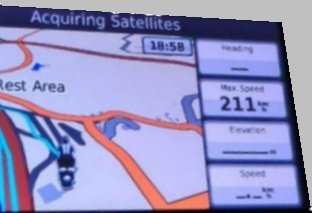You may find it useful to observe what happens on a short test route.
Plan a short route near home from point A to point B - which is along a main road, but which takes short detours and then returns to the main road.
Something like this:

- Test Route Diagram.jpg (22.36 KiB) Viewed 4921 times
The magenta line shows the test route. The black straight line shows the main road.
Make one of the detours stay very close to the main road - like a lay-by - just so that you can see the detour and the main road on the same screen.
Make another one be a short detour up a side street, and returning by the same route.
Make sure that you have route points to force the navigation back onto the main road after each detour.
Make some of the detours have more than one route point - eg the last one on my diagram has 4, and make some of them Waypoints/Via Points (created with the flag tool in Basecamp/Mapsource and some of them shaping points.
Don't worry where they are, or what the ride is like - you are going to completely ignore where the satnav tells you to go and ride along the main road !!
It might be useful to set up the 660 so that it displays the data view on the right hand side. Sorry, I can't remember how to do this on the 660, and the manual doesn't mention it. But you should be able to show Distance to End and Distance to Vias. Once you have the display on the right of the screen, you can touch any of the four data items and choose what data is displayed in it. Not important, but it might help, or you might want to leave that until alter.

- garmin_zumo_660 Data View.jpg (13.58 KiB) Viewed 4921 times
Turn on allow U turns. Turn off auto recalculate. Set off on the route but stay on the main road. Make sure that you can hear the satnav instructions, but ignore them. Watch what happens when you pass the first turn off point. And watch what happens when you see the magenta line appear on the screen up ahead.
You'll get the picture.
Then go back and do it again, this time with autorecalc turned on. This time you will have to be determined to ignore the instructions. Don't be tempted to turn the sound down. Try to understand what it is trying to get you to do, but take absolutely no notice of it - stay on the main road as before. And note what happens when magenta line appears back on the main road ahead, and you rejoin it.
The 'prompted' option for recalculating a route is obvious, but you might as well give that a go as well so that you know what it does.
-------------------------------
nb - don't be tempted to extend the route back to home until you have don the A to B test. It will confuse you - apart from the fact that it will stop navigating as soon as you set off - cos you are already at home. But in effect you will have two magenta lines - one going from A to B, and the last leg coming back along the main road. It is impossible to tell whether the magenta line on the screen is the one going to A or the one coming back. It is even more confusing when the satnav is telling yo to turn left up ahead, but you can see the (return) magenta line continuing along the main road.
Having said that you are bound to want to try it. So - if you do, have auto-recalc turned on, and make sure that the extra route point to get you back home is not placed at home. Place it a mile away. You can probably find your way back from there. This is to stop the 660 from telling you that you have finished the route as soon as you set off.
If you do this final test - place a Waypoint at about point C on the way back from B. As you are riding from A to point B, and after you have passed the location where you place the Waypoint at C, the bike will still be directing you to the next detour and then on to B. Stop, turn the bike round and head home. You will be heading back towards point C. What does the satnav do ? Tell you to go back to the detour that you were heading for and then on to point B or announce that you have arrived at Point C and continue navigating back home.
Then turn back and head towards point B as before. And note what the satnav does then. Does it try to take you back home, or will it take you up the next detour as you had towards B ?
This little exercise will teach you a lot about what the 660 is actually doing, so you won't be confused when it occurs when you are following an unknow route.

